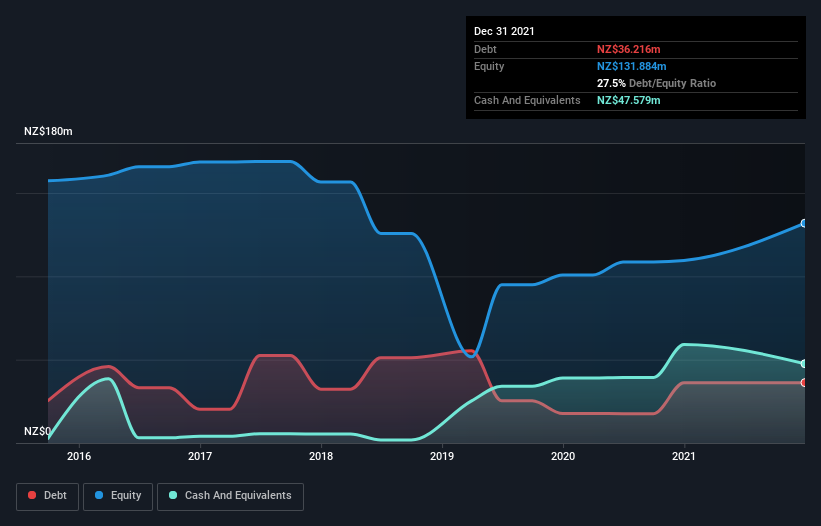Is Evolve Education Group (NZSE:EVO) Using Too Much Debt?
Howard Marks put it nicely when he said that, rather than worrying about share price volatility, 'The possibility of permanent loss is the risk I worry about... and every practical investor I know worries about.' So it seems the smart money knows that debt - which is usually involved in bankruptcies - is a very important factor, when you assess how risky a company is. We can see that Evolve Education Group Limited (NZSE:EVO) does use debt in its business. But the real question is whether this debt is making the company risky.
Why Does Debt Bring Risk?
Debt and other liabilities become risky for a business when it cannot easily fulfill those obligations, either with free cash flow or by raising capital at an attractive price. If things get really bad, the lenders can take control of the business. However, a more usual (but still expensive) situation is where a company must dilute shareholders at a cheap share price simply to get debt under control. Of course, debt can be an important tool in businesses, particularly capital heavy businesses. The first thing to do when considering how much debt a business uses is to look at its cash and debt together.
View our latest analysis for Evolve Education Group
What Is Evolve Education Group's Debt?
As you can see below, Evolve Education Group had NZ$36.2m of debt, at December 2021, which is about the same as the year before. You can click the chart for greater detail. But it also has NZ$47.6m in cash to offset that, meaning it has NZ$11.4m net cash.
How Strong Is Evolve Education Group's Balance Sheet?
According to the last reported balance sheet, Evolve Education Group had liabilities of NZ$42.3m due within 12 months, and liabilities of NZ$250.8m due beyond 12 months. On the other hand, it had cash of NZ$47.6m and NZ$1.69m worth of receivables due within a year. So its liabilities total NZ$243.9m more than the combination of its cash and short-term receivables.
The deficiency here weighs heavily on the NZ$119.7m company itself, as if a child were struggling under the weight of an enormous back-pack full of books, his sports gear, and a trumpet. So we'd watch its balance sheet closely, without a doubt. After all, Evolve Education Group would likely require a major re-capitalisation if it had to pay its creditors today. Given that Evolve Education Group has more cash than debt, we're pretty confident it can handle its debt, despite the fact that it has a lot of liabilities in total.
Importantly, Evolve Education Group grew its EBIT by 88% over the last twelve months, and that growth will make it easier to handle its debt. When analysing debt levels, the balance sheet is the obvious place to start. But ultimately the future profitability of the business will decide if Evolve Education Group can strengthen its balance sheet over time. So if you're focused on the future you can check out this free report showing analyst profit forecasts.
Finally, a company can only pay off debt with cold hard cash, not accounting profits. While Evolve Education Group has net cash on its balance sheet, it's still worth taking a look at its ability to convert earnings before interest and tax (EBIT) to free cash flow, to help us understand how quickly it is building (or eroding) that cash balance. Over the last three years, Evolve Education Group actually produced more free cash flow than EBIT. There's nothing better than incoming cash when it comes to staying in your lenders' good graces.
Summing up
Although Evolve Education Group's balance sheet isn't particularly strong, due to the total liabilities, it is clearly positive to see that it has net cash of NZ$11.4m. The cherry on top was that in converted 183% of that EBIT to free cash flow, bringing in NZ$36m. So although we see some areas for improvement, we're not too worried about Evolve Education Group's balance sheet. The balance sheet is clearly the area to focus on when you are analysing debt. But ultimately, every company can contain risks that exist outside of the balance sheet. These risks can be hard to spot. Every company has them, and we've spotted 3 warning signs for Evolve Education Group you should know about.
At the end of the day, it's often better to focus on companies that are free from net debt. You can access our special list of such companies (all with a track record of profit growth). It's free.
Have feedback on this article? Concerned about the content? Get in touch with us directly. Alternatively, email editorial-team (at) simplywallst.com.
This article by Simply Wall St is general in nature. We provide commentary based on historical data and analyst forecasts only using an unbiased methodology and our articles are not intended to be financial advice. It does not constitute a recommendation to buy or sell any stock, and does not take account of your objectives, or your financial situation. We aim to bring you long-term focused analysis driven by fundamental data. Note that our analysis may not factor in the latest price-sensitive company announcements or qualitative material. Simply Wall St has no position in any stocks mentioned.

 Yahoo Finance
Yahoo Finance 
